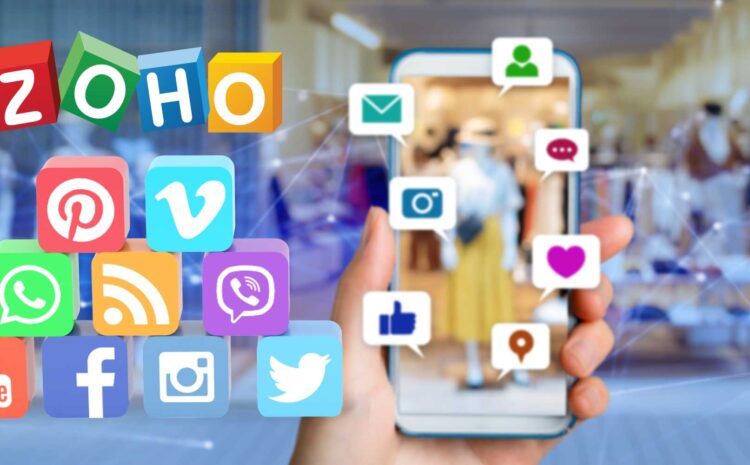Welcome back, everyone! Whether you’re working from a beachside café or your home office, one thing’s for sure—remote and hybrid work is here to stay. In our post-2020 world, distributed teams have become the norm, not the exception. But how do companies manage collaboration, productivity, and customer service when teams are spread across time zones?
That’s where powerful CRM platforms like Salesforce and Zoho come in. These cloud-based tools go beyond customer management—they’re essential for keeping remote teams aligned, efficient, and engaged.
Short on time? Don’t worry—a summary is waiting for you at the end!
The Rise of Distributed Workforces
Remote and hybrid teams offer flexibility, reduce overhead, and give businesses access to a global talent pool. But they also bring challenges:
- How do you keep everyone on the same page?
- How do sales and support teams collaborate across regions?
- How can leaders monitor performance without micromanaging?
The answer lies in digital-first tools that unify communication, centralize data, and automate workflows. And Salesforce and Zoho do exactly that.
Salesforce: Empowering Remote Teams with Cloud-First CRM
Salesforce was built with flexibility in mind. It offers a suite of cloud-based solutions that are perfect for remote and hybrid teams.
1. Real-Time Collaboration with Slack Integration
Salesforce’s acquisition of Slack has made cross-team collaboration seamless. Sales, support, and marketing can work together in channels, share updates, and even trigger CRM workflows directly from Slack.
Example: A remote sales rep closes a deal. Slack instantly notifies the finance and customer success teams—no email chains needed.
2. Cloud Access from Anywhere
Salesforce is 100% cloud-based. That means remote employees can access leads, reports, and dashboards from any device, anywhere. Managers can track pipelines and forecast performance without needing daily stand-ups.
3. Automated Workflows
With Salesforce Flow and Process Builder, repetitive tasks like data entry or follow-up reminders can be automated—saving time and reducing human error.
4. Performance Tracking and Analytics
Advanced analytics and customizable dashboards allow leadership to monitor KPIs, team performance, and deal progress without constant check-ins.
Zoho: A Cost-Effective Powerhouse for Remote Teams
Zoho’s CRM and suite of 40+ integrated business apps offer incredible value for growing companies. It’s especially favored by startups and SMBs in remote and hybrid environments.
1. Unified Workspace with Zoho One
Zoho One includes apps for CRM, project management (Zoho Projects), communication (Zoho Cliq), accounting (Zoho Books), and more—all integrated into a single platform.
Example: A hybrid marketing team uses Zoho Campaigns to run email promotions and tracks ROI in real-time via Zoho CRM.
2. AI-Powered Sales Assistance
Zia, Zoho’s AI assistant, helps remote reps by suggesting best times to contact leads, detecting anomalies in sales trends, and automating reports.
3. Mobility and Access Control
Zoho’s mobile apps ensure that field reps or remote employees can update data on the go. Admins can also control data access based on roles—crucial for maintaining security in a distributed model.
4. Built-In Collaboration Tools
Apps like Zoho Cliq and Zoho Meeting ensure team members stay connected through video, chat, and real-time notifications—all without needing third-party tools.
Key Benefits of Using Salesforce and Zoho for Hybrid Work
- Centralized Customer Data: No more digging through emails or spreadsheets—everything lives in one place.
- Enhanced Team Collaboration: Integrated chat, document sharing, and task assignment features make it easy to work as a team, regardless of location.
- Automated Reporting: Save hours every week with dashboards and reports that update in real-time.
- Security and Compliance: Built-in data governance, access control, and encryption help meet compliance needs—even for global teams.
Real-World Use Case
A global B2B SaaS company uses Salesforce to manage its North American and European teams. The sales team updates leads and closes deals while the customer success team uses Service Cloud to resolve tickets—no matter where they’re located. With Slack channels for each department, communication is instant and organized.
Meanwhile, a UAE-based marketing agency with a hybrid setup runs its operations on Zoho One. From project planning to invoicing and client communications, everything flows through Zoho—keeping both remote freelancers and office staff aligned.
TL;DR: Salesforce and Zoho are transforming how remote and hybrid teams operate. With cloud-based access, built-in collaboration tools, real-time reporting, and automation, these platforms help distributed teams stay productive, connected, and focused on what matters: customer success.
Hope you enjoyed this post! While you’re here, why not check out a few of our other pieces? We have several blog posts on HR, Cloud Technologies, Salesforce CRM, AI, Salesforce CPQ, Zoho, Bitcoin, Cybersecurity, AWS, and many other topics we just know you’ll love. Browse the topics here!




